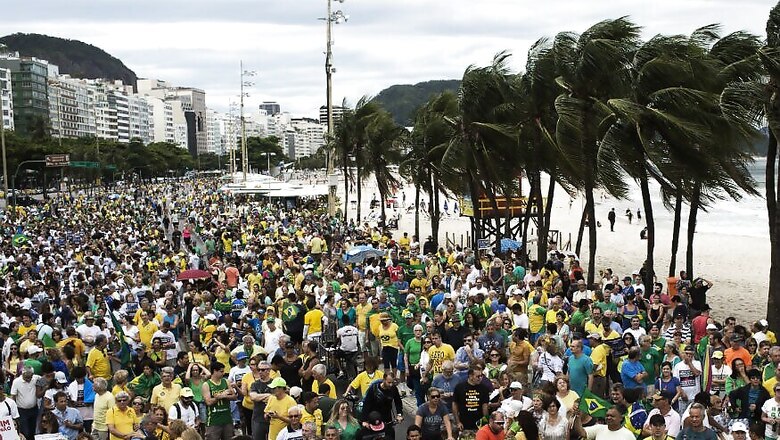
views
Rio de Janeiro: Tens of thousands of protesters took to the streets in cities across Brazil on Sunday to express disgust with public corruption and outrage at what they say are lawmakers' attempts to muzzle the judges and prosecutors pursuing those crimes.
Protesters, many dressed in the green and yellow of Brazil's flag, massed along a major artery in Sao Paulo and along Copacabana beach in Rio de Janeiro. Other protests were held in cities around the country. Many demonstrators wore T-shirts or held banners in support of Sergio Moro, the judge who has led a hard-charging investigation into a kickback scheme involving the national oil company, several construction conglomerates and politicians.
The investigation, known as Operation Car Wash, has shocked Brazilians both for the scale of corruption it has revealed and for the commitment of the judiciary to see it through in a country where many feel the rich and powerful act with impunity.
But Sunday's demonstrations also united a motley group of protesters whose only common cause appeared to be disgust with elected officials. They represented a cross-section of an increasingly fractured Brazil. In addition to those supporting the corruption investigation, some held signs calling for the removal from office of the president and leaders in Congress. Some called for the jailing of a former president now facing corruption charges. Still others were advocating a return to military rule.
"I want people who have character running the country," said Regina Medeiros, a 67-year-old retiree, who held a banner that read: "Let's finish with political parties before they finish Brazil." ''People are losing faith in other human beings," she added.
Around 15,000 people protested in Sao Paulo, according to an estimate from military police; they said they did not have a number for demonstrations in Rio de Janeiro. At least another 40,000 people came out in scores of other cities around Brazil, including the capital of Brasilia, according to estimates from military police published by the G1 news portal.
Many hoped that after former President Dilma Rousseff was impeached and removed from office earlier this year, Brazilian politics would settle, and reforms proposed by the new president might pull the economy out of deep recession. But instead, those reforms have met with significant protests, President Michel Temer has seen his popularity plummet, and the economic crisis appears to be worsening.
Through it all, accusations of corruption against former or current leaders seem to come weekly. Scandal has touched several members of Temer's Cabinet, and six have resigned. Meanwhile, anger at the scale of corruption and frustration with the impotence of the government to address it is rising.
The one bright spot appeared to be the tenacity of the judiciary and its determination to see through Operation Car Wash.
But last week, the prosecutors leading that investigation threatened to quit, accusing Congress of passing legislation that would leave them vulnerable to retribution from those they have prosecuted. The measure, approved in a marathon overnight session in the lower house of Congress as part of a package of anti-corruption laws, would allow defendants to accuse prosecutors and judges of abusing their authority.
"In the middle of the night, the house of deputies disfigured this (anti-corruption) project. Instead of punishing the corrupt, they want to punish investigating prosecutors and judges," said Agnes Musseliner, a prosecutor who attended the protest in Rio. "We are here to protest against this absurdity, to guarantee the independence of the public prosecutor's office and Brazilian judicial authority."
The package was proposed by the public prosecutor earlier this year and included measures that would toughen penalties for corruption and accelerate the handling of corruption cases in courts. But in its overnight session, held while Brazil was mourning the deaths in a plane crash of members of a beloved soccer team, the lower house of Congress dropped some of the toughest measures, like allowing prosecutors to reach more plea bargains, in addition to adding the one that allows prosecutors and judges to be charged with abuse of power.
Paola Augusta Mariano Margues, a 31-year-old prosecutor in Sao Paulo, said the measure could have a chilling effect on investigations because it could leave prosecutors vulnerable when investigations don't lead to charges.
Moro has called it an effort to intimidate the judiciary and halt Operation Car Wash before it implicates any more lawmakers. He pleaded with the Senate not to pass it, and judges and prosecutors are asking the president not to sign if it does.
"Sergio Moro, we are with you," read a giant banner at the Sao Paulo protest, where demonstrators frequently chanted his name.















Comments
0 comment